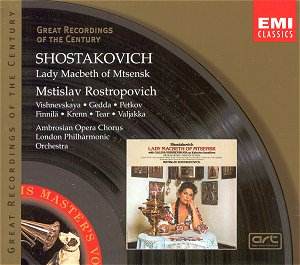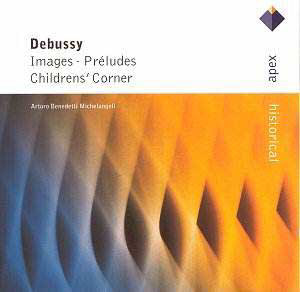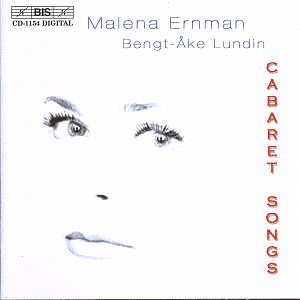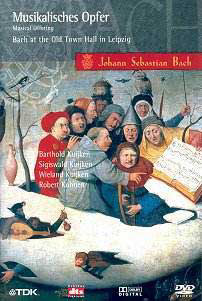 Composer: Dmitri Shostakovich
Composer: Dmitri Shostakovich
Works: Lady Macbeth of Mtsensk
Performers: Katerina Ismailova – Galina Vishnevskaya (soprano), Sergey – Nicolai Gedda (tenor), Boris Ismailov – Dimiter Petkov (bass), Zinoviy Ismailov – Werner Krenn (tenor), Shabby peasant – Robert Tear (tenor), Aksinya – Taru Valjakka (soprano), Sonyetka – Birgit Finnilä (soprano), Sergeant – Aage Haugland (baritone), Teacher – Martyn Hill (tenor), Priest – Leonard Mróz (bass), Old convict – Alexander Malta (bass)
Recording: Recorded: 1, 3, 5-7, 10, 11, 16, 19-22 IV 1978, No.1 Studio, Abbey Road, London; Digitally remastered at Abbey Road Studios 2002
Label: EMI Classics
Dmitri Shostakovich’s Lady Macbeth of Mtsensk stands as a provocative cornerstone of 20th-century opera, a work that wrestles with themes of desire, power, and moral ambiguity. Composed in 1934, this opera draws inspiration from Nikolai Leskov’s novella, illustrating the tragic consequences of a woman’s rebellion against societal constraints. Its initial reception was marked by a mix of admiration and outrage, reflecting the turbulent socio-political landscape of the Soviet Union. The recording under the baton of Mstislav Rostropovich captures the work in its rawest, most emotionally charged form, presenting a visceral experience that aptly mirrors Shostakovich’s own tumultuous relationship with authority.
Rostropovich’s interpretation is a masterclass in orchestral color and character portrayal, revealing the inherent contrasts within Shostakovich’s score. The London Philharmonic Orchestra, under his direction, navigates the wide spectrum of moods, from the chilling tranquility of the opening scenes to the explosive violence that erupts later. The orchestration is meticulously balanced, allowing the intricate web of strings to intertwine seamlessly with the potent brass and woodwinds. For instance, the orchestral interludes serve not merely as transitions but as emotional landscapes that amplify the dramatic tension. The clangorous brass motifs juxtaposed against the lyrical string passages create a palpable sense of impending doom, a hallmark of Shostakovich’s style.
Galina Vishnevskaya’s portrayal of Katerina is particularly noteworthy; she embodies the complex duality of the character with striking fervor. Her voice captures both the venomous rage and the desperate vulnerability of Katerina, especially evident in her poignant aria “Zherebýonok k kobýlke torópitsa.” Here, Vishnevskaya’s ability to convey emotional depth through her nuanced vocal techniques is mesmerizing. The tension in her delivery contrasts starkly with Dimiter Petkov’s portrayal of Boris Ismailov, who, while effectively embodying the character’s loathsome qualities, could benefit from greater dynamic variation in his earlier scenes. However, his ghostly return later in the opera showcases a dramatic transformation, revealing the rich complexity Shostakovich imbues within his characters.
Nicolai Gedda’s performance as Sergey embodies a compelling blend of seduction and treachery, his distinctive timbre adding an unexpected richness reminiscent of Wagnerian heroes. His duets with Vishnevskaya are laden with emotional conflict, capturing the essence of betrayal and desire. The vocal interplay between them during the turbulent scenes leading to violence is palpable, heightening the opera’s dramatic stakes. Taru Valjakka as Aksinya delivers a heartrending portrayal of victimhood, her vocal clarity cutting through the dense orchestration with chilling effect. The raw emotion she conveys in her scenes is matched by Birgit Finnilä’s Sonyetka, whose voluptuous tone is both alluring and treacherous.
The technical quality of the recording is commendable, especially considering its age. The digital remastering at Abbey Road Studios enhances the clarity of the orchestral texture without sacrificing the raw power of the performance. The sound engineering ensures that the listener is enveloped in the visceral soundscape Shostakovich intended, allowing for an immersive experience that highlights every nuance of the score.
The combination of Rostropovich’s dynamic conducting, a stellar cast, and the rich orchestration culminates in a performance that stands as one of the definitive recordings of Lady Macbeth of Mtsensk. This recording not only illuminates the complexities of Shostakovich’s masterpiece but also serves as an invitation to those who may harbor biases against the composer’s style. The emotional potency, combined with the meticulous attention to detail in both the orchestral and vocal performances, offers a profound insight into the human condition, making this recording an essential addition to any serious opera collection.



